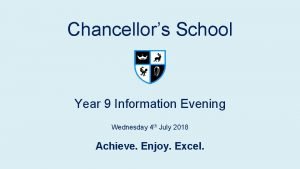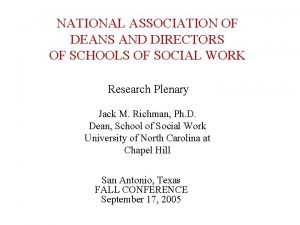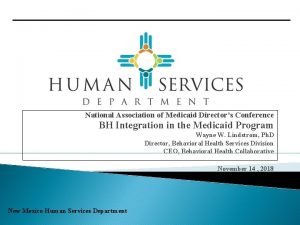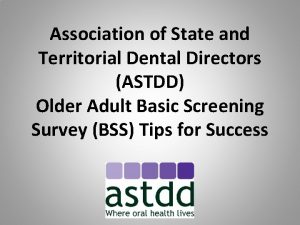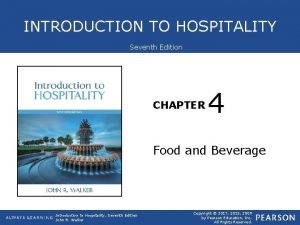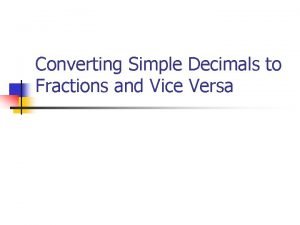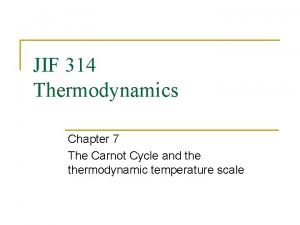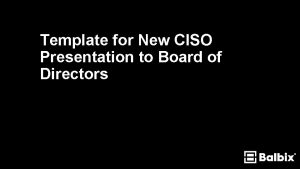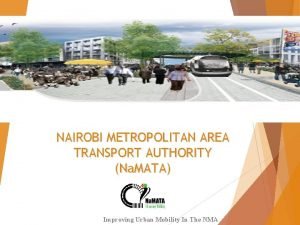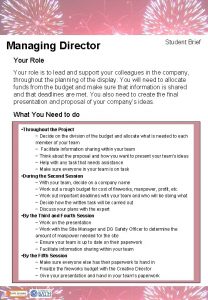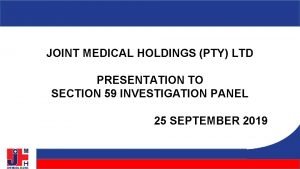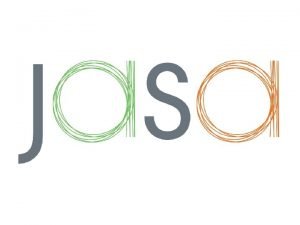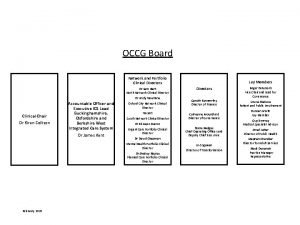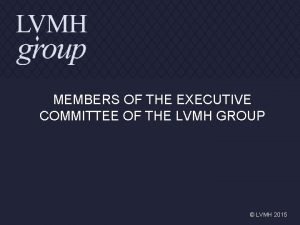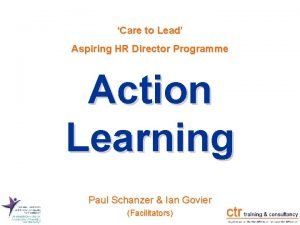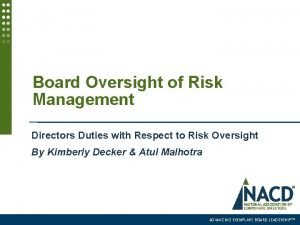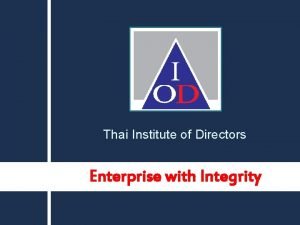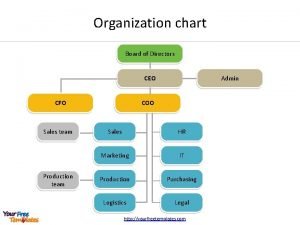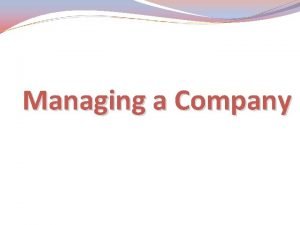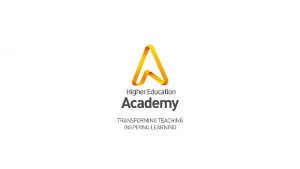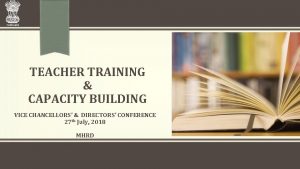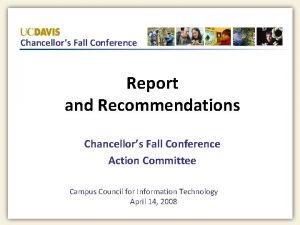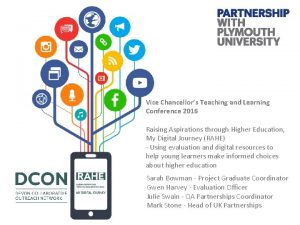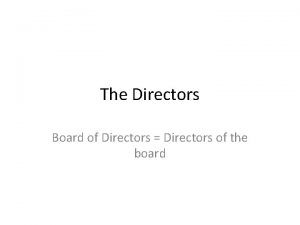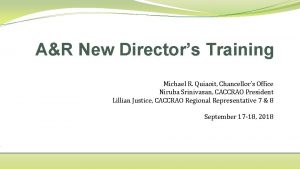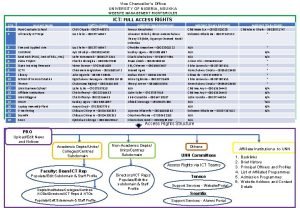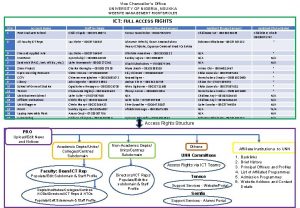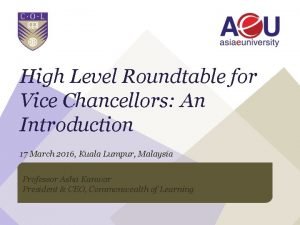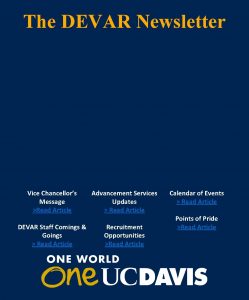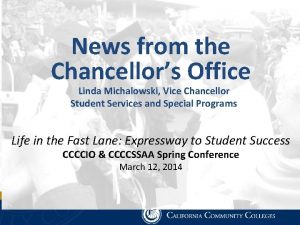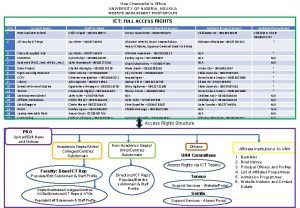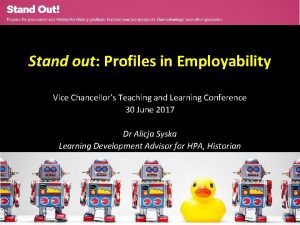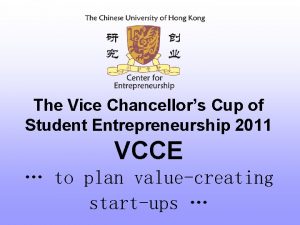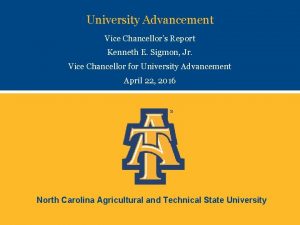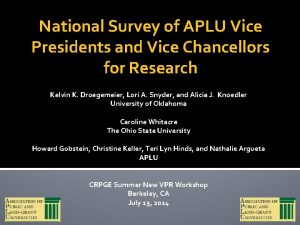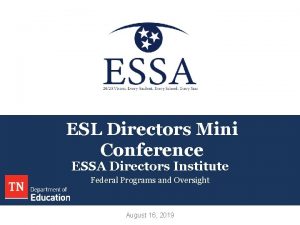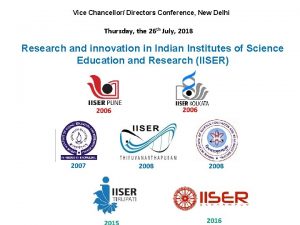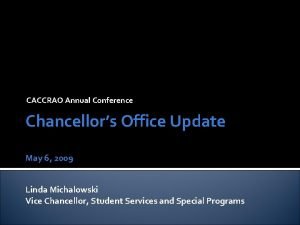National Conference of Vice Chancellors and Directors on




























- Slides: 28

National Conference of Vice Chancellors and Directors on Research & Innovation UGC - Quality Mandate Prof. D. P. Singh Chairman University Grants Commission 1

Our Role Models 2

• Achieving target Gross Enrolment Ratio of 30% by CHALLENGES IN HIGHER EDUCATION 2020 • Developing intellectuals rather than just degree holders • Developing youth with environment sensitivity, human values and professional ethics • Preparing youth for global competitiveness and employability • Extending the reach of Higher Education (ODL, MOOCs) • Attracting and retaining qualified and competent faculty • Establishing World class institutions of higher learning 3 and research

CHALLENGES IN HIGHER EDUCATION • Enhancing the quality of academic and sponsored research • Promoting applied research, innovation, incubation and entrepreneurship • Motivating HEIs to participate in accreditation, NIRF and Global ranking • Strengthening the industry-institute interaction 4

Quality & Excellence Quality & Quality is not achieved accidently; it always results from good intention, sincere efforts, intelligent direction and meticulous execution. . . “Excellence in thinking and action is the foundation for any mission. Excellence is not by accident. It is a process, where an individual or organization or nation continuously strives to better oneself” Dr. APJ Abdul Kalam 5

UGC Mandate for quality - targets 1. Improve the graduate outcomes: – At least 50% students secure employment/selfemployment or – engage themselves in pursuit of higher education. 2. At least 2/3 rd of the students engage in socially productive activities during their period of study 3. Train at least 75% of the students in essential professional skills – Soft skills: – innovation/entrepreneurship – critical thinking 6

UGC quality mandate- targets 4. Teacher: – vacancies at any point not exceed 10% – 100% of the teachers oriented every year - emerging trends in their respective domains and the pedagogies that translate their knowledge to the students. 5. Every institution shall get NAAC accreditation with a minimum score of 2. 5 by 2022. 7

Initiatives ICT based- teaching learning process Induction programme Promoting quality research Learning Outcomes based Curriculum Framework Tracking of student progress Initiatives Social-Industry connect Mentoring of nonaccredited institutions Teacher Induction training Soft skills Examination reforms 8

Induction Programme for Students Focus – Orientation of New Students • 6 days Induction programme : • Bonding and familiarization with Institution, faculty and inculcation of human values • Concerns of students: insecurity about future, aspirations, career orientation • Activities: • Physical Activity, Mentoring, Familiarization to Dept. /Branch, Creative Arts and Culture, Literary Activity, Lectures by Eminent People, Visits to Local Area. . 9

Induction Programme for Students Action Plan and Timeline: • A guide for Induction Programme to all HEIs- Aug, 2018 • Implementation- Regional workshop for teachers - Nov - Dec, 2018 • HEIs - initiate action on implementation of Induction Programme 10

Learning Outcomes based Curriculum Framework • Focus - Learning and Outcomes • Achieve aims of education - knowledge, understanding, employability, soft skills, attitudes and values • Life long learning skills • Teacher centric to student centric pedagogies • Technological interventions • Subject specific curriculum templates 11

Soft skills Focus: Personality Development Emotional Intelligence Social Intelligence Communication and presentation Skills Soft skills Team work Time Management Problem solving Critical and Reflective thinking Moral and ethical awareness/reasoning Analytical reasoning 12

Learning Outcomes based Curriculum Framework Action Plan and Timeline: • Subject specific expert committees- 37 subjects • Model Curriculum – Oct, 2018 • HEIs – may initiate the revision process • Revised LOCF based curriculum – Next academic session to be implemented by all Univs 13

Assessment and Evaluation Focus - Continuous evaluation of Learning Outcomes • Continuous evaluation: Assessment not in a single shot; opportunity to learners for improvement • Combination of formative, interim and summative assessment • Problem based assignments; individual project reports (case-study reports); team project reports; oral presentations, seminar presentation; computerized adaptive testing; peer and self-assessment • Technological interventions : measure wider range of skills and knowledge • Digital depository of degrees and marksheets 14

Assessment and Evaluation Action Plan and Timeline: • A report on Examination reforms: Oct, 2018 • Implementation- Regional workshop for teachers : Dec 2018 • HEIs: revise evaluation system from next academic session 15

Teachers “Teaching is not a profession but a mission”. He further said that “the very best minds in the country should be teachers”. Dr Sarvepalli Radhakrishnan 16

Faculty Development Focus: Faculty enrichment • Induction Training for all Newly recruited Faculty: • Awareness about emerging developments • Equip with science and art of teaching • Technology integration, e-learning resources • Self empowerment, motivation, team work and leadership • Sensitization and engagement with issues such as gender, environment and sustainability, social cohesion, national integration, human values and professional ethics etc. • Annual Refresher Training for all Teachers. • Leadership / Management training for all educational administrators. • HRDC, NRCs, TLC and FDC 17

Faculty Development Action Plan and Timeline: • Induction programmes for newly recruited faculty - Oct, 2018 onwards • Refresher courses for in-service faculty§ Ongoing through 66 HRDCs-2018 -19 § SWAYAM courses in every discipline starting from Nov 2018 • Leadership development for academic administrators - to be launched by MHRD in Sept. 2018 • • Senior functionaries from Universities to join the MHRD programme HEIs to encourage and depute teachers for these programmes 18

Social & Industry connect Focus - Connect HEIs with local communities by engaging the faculty and students. • Adoption of 05 villages by Universities and Colleges • Customization of technologies as required by the people • Institution – Industry interface – curriculum development, field exposure; internships, summer training, applied research, consultancy, employment etc.

Social & Industry Connect Action Plan and Timeline: • Join the Unnat Bharat Abhiyan • 1 -2 credit course to instil Institutional social responsibility- Jan, 2019 • HEIs: adoption of new course from next academic session 20

Student Progression • Focus – Alumni engagement – Exit Programme for final year students – Alumni Cell/ Association in HEIs – Alumni Portal for tracking student/alumni progress – HEIs to have a dedicated webpage/ link for alumni – Stay connected - Social media – Alumni Excellence Awards – Encouraging Alumni for contributing / giving back to the institution

ICT based Learning tools Focus – Technology Adoption in Education • ICT based learning tools - effective teachinglearning process • Online learning through E- PG Pathshala • MOOCs - SWAYAM • National Digital Library (NDL) • UGC Regulations for Online Programmes, 2018 - Certificate, Diploma and Degree programmes allowed for eligible institutions.

ICT based Learning tools Action Plan and Timeline: • All univs to adopt SWAYAM courses for credit transfer immediately • HEIs - Students and Faculty may be encouraged to use SWAYAM Platform. • UGC to develop 100 MOOCs every year 23

Promoting Quality Research Focus – Quality Research and Innovation • Promoting Research - Socially/Locally Relevant and Nationally/Globally Significant. • Integration of research output with community well being. • Alignment of Institutional Objectives & Policies to contribute towards new knowledge & Innovation. • Nurturing culture for Quality Research, Innovation & Publications. • Faculty’s motivation and commitment.

Promoting Quality Research Action plan and Timeline: • Identification of Significant Domains and Sub-domains by the core Committees –Aug- Sept, 2018. • Invitation of Online Research proposals - October, 2018. • Technology enabled evaluation & assessment of proposals for grant of research projects - March, 2019. • HEIs to establish - Incubation Centres and Research Parks by 2020. – Mentoring of young research scholars – Support, Facilitation & Encouragement from Funding Agency & Institutional administration. 25

Mentoring of Institutions Focus - Mentoring of weak institutions • Mentoring of non accredited institutions by a well performing (NAAC score of over 3. 26) Institution • Mentoring allows : – sharing of knowledge, information and resources – Opportunities for research collaboration and faculty development. – Guidance and encouragement to institutions to adopt best practices 26

Mentoring of Institutions Action Plan and Timeline: • Design and Development of framework- Sept, 2018 (NAAC) • Connect Mentor and Mentee ; sharing of best practices – Oct, 2018 (NAAC) • Execution and Monitoring programmes – Dec, 2018 (UGC) 27

Thanks 28
 Pars chancellors
Pars chancellors National association of deans and directors
National association of deans and directors National association of state medicaid directors
National association of state medicaid directors Astdd
Astdd Food and beverage directors expect a pour cost of
Food and beverage directors expect a pour cost of Changing decimals to fractions and vice versa
Changing decimals to fractions and vice versa Conversion of work into heat and vice versa
Conversion of work into heat and vice versa Annulenes aromaticity
Annulenes aromaticity Board of directors presentation template
Board of directors presentation template Namata board of directors
Namata board of directors Directors brief
Directors brief Jmh board of directors
Jmh board of directors Directors emma wolverson
Directors emma wolverson Compliance presentation to board
Compliance presentation to board Kpmg directors toolkit
Kpmg directors toolkit Blade runner german expressionism
Blade runner german expressionism Clinical directors network
Clinical directors network Chantal gaemperle linkedin
Chantal gaemperle linkedin Aspiring directors programme
Aspiring directors programme Board of directors risk oversight responsibilities
Board of directors risk oversight responsibilities Thai institute of directors association
Thai institute of directors association Npc board of directors
Npc board of directors Perfectionist directors
Perfectionist directors Coo
Coo Classification of directors
Classification of directors Perfectionist directors
Perfectionist directors Anjli dudani
Anjli dudani Westinghouse board of directors
Westinghouse board of directors Section 11 company directors disqualification act
Section 11 company directors disqualification act
